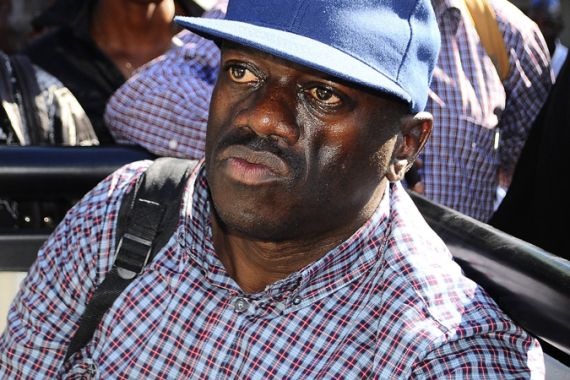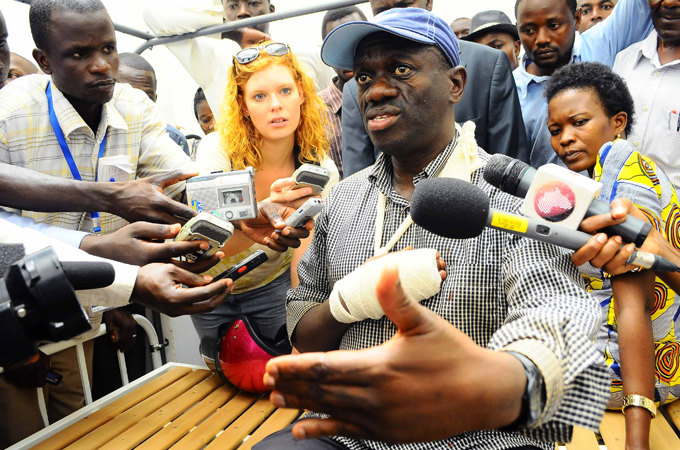Profile: Kizza Besigye
Ugandan opposition leader nicknamed the “hammer” after vowing to remove long-term president Yoweri Museveni from office.

 |
| Besigye fell out with Uganda’s president, Yoweri Museveni, when he started criticising his government [Reuters] |
A little more than a decade ago Kizza Besigye was fondly called the “hammer” by many of his supporters.
Uganda’s leading opposition figure earned the nickname after he traversed the country on the campaign trail in 2001, saying his opponent was a bit like a cotter pin and that disloding him from office would require a candidate with the strength of a hammer.
He said he would “hit” and remove Yoweri Museveni, who has ruled Uganda for the past 25 years and won re-election for a new five-year term in the February 18 election. The opposition labelled that vote a sham.
Besigye, 56, was Museveni’s personal physician in the early 1980s when Museveni waged a five-year guerrilla campaign against the government of Milton Obote, the country’s independence leader who died in a South African clinic in 2005, after spending 19 years exiled in Zambia.
Besigye himself took part in the armed rebellion and served in the government as a junior minister for the interior. But he fell out with the Museveni administration after accusing it of corruption and incompetence.
String of grievances
In 1999 he detailed his grievances against the government in a treatise that set him on a collision course with the president. The army, whose mechanised brigade he once led, threatened to courtmartial him, but abandoned the idea.
In 2001 Besigye, a retired colonel, contested the presidential election, posing the biggest challenge ever to Museveni’s rule. Uganda then did not allow political parties to field candidates, having banned them after Museveni seized power in 1986. Contenders used “individual merit” as the basis for election to office.
Besigye lost the election and took his case to the Supreme Court alleging fraud, but the court ruled that irregularities did not happen on such a large scale as to alter the outcome of the election.
The authorities started to monitor Besigye’s movements and linked him to a series of explosions that hit Kampala, the capital, after the election. He was intercepted by security forces at Lukaya as he travelled to the southwest and was eventually forced to seek asylum in South Africa, where he lived for four years.
His party, the Forum for Democratic Change (FDC), was formed while he lived in exile and he returned to Uganda in 2005 ready to contest the 2006 elections. Three weeks after his return he was arrested by the government and charged on trumped-up charges of rape.
Although he was freed from detention ahead of the election, he barely had time to campaign. Security forces continued to disrupt his rallies and even shot some of his supporters in Mengo on the outskirts of Kampala.
‘Biased’ electoral commission
Besigye lost the election and went to the Supreme Court for a second time, alleging widespread fraud and rigging. In accordance with Uganda’s electoral laws, the court ruled that cases of irregularities that Besigye’s lawyer presented did not happen on a large scale and that the election outcome was – by and large – representative of the will of the voters.
Besigye, whose wife is a former member of parliament and Museveni’s ex-girlfriend-turned-critic, has accused the electoral commission of being biased and has previously called for it to be disbanded. The government insists it is independent and that its head and the commissioners are vetted by parliament’s appointments committee.
Before the February 18 elections, Besigye formed a coalition with five small parties hoping that a united opposition would loosen Museveni’s grip on power. But two of the major opposition parties – the Uganda Peoples Congress and the Democratic Party – fielded their own candidates, depriving the coalition of much needed support.
Besigye told Al Jazeera ahead of the elections that large sums of money had been spent by the ruling party to bribe voters, another reason he says his opponent managed to win the election.
Described as a “perennial loser” of elections by his critics, Besigye had threatened to stage Egypt-style protests if the election was rigged. He still maintains he was robbed of victory and on April 12 he told Daily Monitor, a semi-independent newspaper, that “we don’t accept that there was even an election. It was a total sham”.